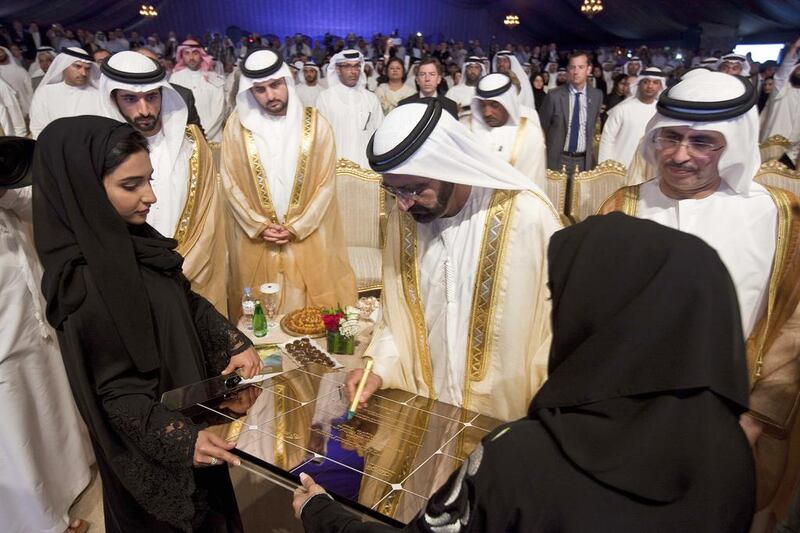DUBAI // Dubai has turned to the sun to power the future.
The emirate officially launched its Dh120 million 13-megawatt photovoltaic power plant at Seih Al Dahal, 30 kilometres southeast of the city.
The plant uses the sun’s light to produce electricity and has already been feeding the emirate’s grid with green power for a few weeks.
It is the first stage of the planned Mohammed bin Rashid Al Maktoum Solar Park, a vast complex with an output capacity of 1,000 megawatts by 2030.
“We are on the right track,” said Saeed Al Tayer, managing director of Dubai Electricity and Water Authority. “We are implementing our strategy on sustainability.”
The solar plant is Dubai’s largest, capable of displacing 15,000 tonnes of carbon dioxide a year – the equivalent of removing 2,000 cars from the road. It is also the largest photovoltaic plant in the region.
Masdar, Abu Dhabi’s clean energy company, operates a 10-megawatt photovoltaic plant at its headquarters and the 100-megawatt Shams 1 plant near Madinat Zayed, which uses concentrated solar power to heat thermal fluid and produce energy through a steam turbine.
The new photovoltaic plant in Dubai was built by the American solar panel manufacturer First Solar, who will operate it on behalf of Dewa. The company’s regional projects director Matt Merfert said its thin-film technology was well placed to overcome one of the biggest challenges for solar energy in the region – the high heat, which lowers the efficiency of panels.
The company’s thin-film modules have a lower power loss than any other photovoltaic technology. “This is partly why our technology was selected for this project,” he said.
The company also developed a water-less method to clean the panels, in a bid to overcome the high amounts of dust.
“To contrast with the bigger historical solar markets, Europe and the Americas, cleaning is not typically required so this is a new challenge for solar companies,” he said.
“We have modelled the soiling accumulation, we have developed a special cleaning system and we are operating the plant at full power now. We are very happy to say that the soiling is not negatively affecting the plant beyond what it should and the problem is essentially addressed.”
Next in line for Dubai is a 100-megawatt plant on the site within three years.
“As we are finishing the work on one project, we will start the work on another,” said Mr Al Tayer, who is also vice chairman of Dubai’s Supreme Council of Energy.
The new plant will also rely on photovoltaic technology. Dewa is looking for a private partner who will own 49 per cent of the project. Tendering is expected to end in the next six months.
Waleed Salman, Dewa’s executive vice president for strategy and business development, said the new project was likely to cost as much as Dh800m. The preferred partner will be a company “with experience in the market internationally and locally”.
“Our objective is to create an industry, a new trend on the market, and establish Dubai as a leader,” said Mr Salman, who is also chairman of the Dubai Carbon Centre of Excellence.
Dewa is finishing the codes and procedures for a solar rooftop programme, to allow for the installation of smaller solar systems in buildings in Dubai. The programme is expected to start in 2014.
vtodorova@thenational.ae





